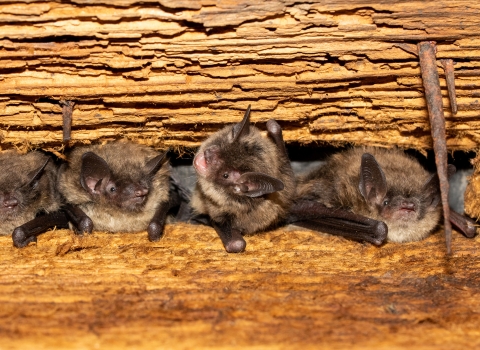The sunshine is coming out; the air is warmer; and the days are getting longer – all signs that spring is here. Local garden centers are already buzzing with people picking out flowers and vegetable plants, and bees, butterflies and other pollinators will bask about in the resulting gardens.
Amber Aguilera, the Listing and Classification Division Supervisor at the U.S. Fish and Wildlife Service’s Sacramento Fish and Wildlife Office, is an avid gardener who keeps pollinators and birds top-of-mind as she lays out her annual garden. A northern California native, she developed her love of gardening by spending hours outside with her mom and dad working in their backyard garden. As Amber pursued a career in wildlife biology, she learned about the negative impacts of some chemical-based pest and weed control products on pollinators.
“Neonicotinoids can be found in garden pest control sprays. While they are designed to target specific pests, they also can also be lethal to pollinators,” said Amber.
Amber avoids using chemicals in her garden and opts instead for organic or nature-based pest and weed control solutions. Here's her top 5 tips for keeping a garden pest-free while helping pollinators.
5 Pollinator-Friendly Ways You Can Manage Garden Pests
#1. Use insects to combat insects
Did you know that you can purchase ladybugs and preying mantises? Each year, Amber gets a container full of ladybugs at her local hardware store and releases the tiny red insects into her garden. Ladybugs can keep aphids and white flies under control.
#2. Companion planting adds color and protection to your garden
If you only plant a single type of vegetable in a raised bed, you run the risk of losing all your plants if an insect infestation or fungus occurs. Amber recommends placing marigolds between rows of tomatoes or other vegetables. Not only do the marigolds provide a fun pop of color to the bed, they provide a first line of defense against pests.
“The marigolds give the pests something to eat before they reach the tomatoes,” she said.
If marigolds aren’t on your list, consider adding onions and garlic. The smell can deter insects and rodents from exploring your garden.
Flowering herbs, like lavender, thyme and basil, are also good companions for your fruits and vegetables, and they add layers of lovely scents to your garden. The flowers of each of these plants can attract pollinators and provide food for birds when they turn to seed.
“Everything from bumblebees to Anna’s hummingbirds and finches visit my garden. They’re all coming for something different,” said Amber.
#3 Get your hands dirty
Amber doesn’t use any chemical weed killers. Instead, she pulls tiny weeds that sprout up in her garden by hand. By dedicating a few minutes a day to weed pulling, she keeps the weeds in check. She also pulls tomato horn worms off the plants by hand and tosses them in the grass nearby.
“My hope is that the birds come down and eat them,” she said.
Studies have shown that spending time in a garden can help your mental and physical health, so get those hands dirty!
#4 Keep it natural and clean
Pill bugs – also known as roly poly bugs—don’t respond to some of the pest control methods, but they can’t stand a rough surface. Amber keeps a small box of Diatomaceous earth on hand and sprinkles it around the edges of her garden if she sees the pill bugs marching in. The powder is made from ground-up shells or diatoms from the ocean. The rough powder is a big deterrent for the little bugs. It can also help with slug and snail control.
Amber also mixes a little bit of dishsoap with some water and sprays it on her plants to control white flies. Too much soap can kill the plant, so start with a small amount and see how your plants do.
#5 Pass them a cold one?
It may sound strange, but some pesky insects are attracted to beer. Amber pours a small amount of beer into small containers that are easy for bugs to climb inside but tough to escape. These miniature watering holes should be emptied on a regular basis – bugs can accumulate fairly quickly. And no, it doesn’t have to be an expensive beer; the bugs aren’t picky.
Try it yourself!
These small steps can have a big impact. When we take care of the pollinators in our backyard, we also help support regional food production. Give these tips a try, and we hope you a summer full of juicy, red tomatoes!










